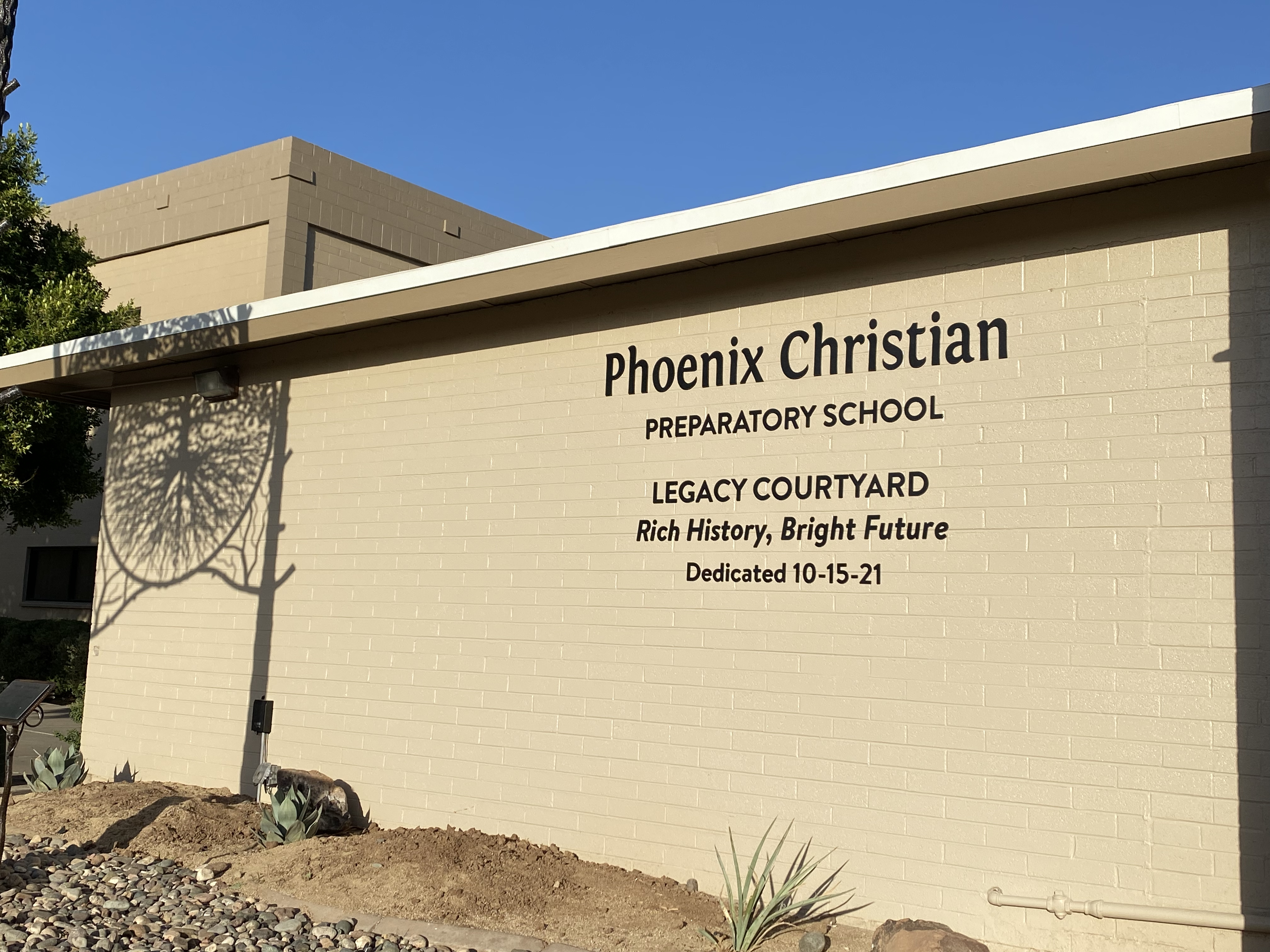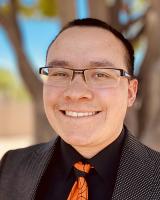Keeping faith in the classroom and on the field at Phoenix Christian
December 6, 2021 by Zachary Wargo, Arizona State University

Zach Wargo is an ASU Cronkite School of Journalism student assigned to cover Phoenix Christian for AZPreps365.com.
Phoenix Christian is a private school that’s tightly connected through prayer, athletics, and enrichment programs to give students opportunities to feel welcome and safe — and learn the basis of religion and learn how to keep a close relationship with God on and off the playing surface.
Cristian Mackey is a senior and played quarterback for Phoenix Christian’s football team this past season. Mackey has been playing football since he was in fifth grade and also plays boys volleyball. Mackey is generous and tries to remain as positive of a person he can be every day, he is especially thankful for his God-given ability to play football and to stay healthy this past season.
“Throughout my life, I try to keep myself as positive as possible, there have been people who have gone through worse stuff than I have, and I think that I am very blessed, and having a positive outlook on life and appreciating what you have is important,” Mackey said.
Mackey grew up in a religious family and knows that he will uphold his Christian principles once he becomes an adult. He graduates from high school this spring, as he’s excited to keep his family close as he continues to involve his beliefs in life to stay as generous as he can be in the future.
The athletic program offers 12 middle school sports and 12 high school sports, which helps embody participation at the school. Phoenix Christian proudly supports all the sports offered which includes prayer before and after sporting events that help students learn sportsmanship and lets them make friends at a young age.
The school wants students to learn religious values with activities that take place after school. Some programs include community service days and student-led chapels at Phoenix Christian.
Phoenix Christian has used prayer this past football season before games to wish for health and safety for the Cougars and the opposing team. After games, a group prayer for a healthy season and wishing the opposing team safe travels back home stay true to Phoenix Christian’s beliefs.
Head football coach and athletic director Dan Fort loves the fulfillment of using religious beliefs to teach athletes how moments can stick after they graduate. He says there will be an experience that happens to a student, which allows learning what the Bible says and how to react to certain situations whether it's on the field or in life.
Fort wants it to mean more than sports, so his athletes can take away the lessons and religious teachings they have learned for the rest of their lives and for future generations.
“Mentoring a kid for the Lord should have lasting ramifications for four, or five, or six generations,” Fort said. “When you think about it, it lives long beyond your coaching career as long as your own life.”
Ben Stryczek teaches history, is the head coach for boys basketball, and is in his first year as the school’s assistant athletic director. He says being a Christian educator is not easy but he has incorporated ways to teach students and his players to develop their Christian beliefs.
“Specifically, we do that by praying before and after every game, every practice, we do mentorships with the older guys and they have a younger counterpart that they mentor,” Stryczek said. “That’s one of the main reasons I decided to come to Phoenix Christian, I love the opportunity to be able to share my faith and beliefs.”
Stryczek also said he shares Bible passages with his basketball team, which is similar to the way Fort said he wants to influence his athletes at Phoenix Christian.
Today, prayer is seen around the sports world before and after sporting events, including football. Arizona State religious studies professor Terry Shoemaker says it's happened for years at Christian universities like Baylor and TCU for prayer, well-being, and good health before football games.
Shoemaker teaches numerous classes at Arizona State, he’s established a religion and sports class every semester for students to learn about certain cases that have happened within the two topics and explain how they are connected.
“The main purpose of the class is to examine the relationship between religion and sports, and this is a really diverse topic,” Shoemaker said. “There are hundreds of ways to think about how religion gets into sports, it’s a really interesting topic.”
According to Shoemaker, there are Christian groups that think sports could be interfering with spirituality. Such examples as James Naismith inventing the game of basketball in 1891 for people who didn’t want to play football. Christians felt that football was so violent, and it was against their religious values.
From aleteia.com, which is a Catholic news site founded in 2011, examines how Naismith was motivated with how he could “exemplify Christian life” and “develop the whole person, mind, body and spirit” in the gym. Researchers say that Naismith wanted the game to be as safe as possible.
“Initially, Christians hated the game of football because it was associated with swearing and gambling,” Shoemaker said. “It’s viciously violent and most Christians were totally opposed to it when football first was created.”
Shoemaker describes how prayer before and after games can be used as a coping mechanism, and how for student-athletes it can be interpreted as a protective amulet for safety, and protection from harm.
The basis of prayer and sports has been a controversial topic, especially at football games. According to oyez.org, which is an archive of U.S. Supreme Court cases, a 2000 decision featured the Santa Fe Independent School District in Houston and a Mormon and a Catholic family that sued the school district for violating the First Amendment.
In that court case, the Supreme Court ruled that beginning football games with a prayer led by a student violated the First Amendment, which impacted opportunities for religious messages at other public schools across the country. The court ruled that public prayer is not allowed, since the school was on government-owned property.
Shoemaker describes a reason that prayer in public schools is not allowed anymore due to Catholics and Protestants not agreeing on who should lead those prayers, which led to public school systems eliminating prayer to avoid a massive conflict.
Religion has been on the decline in America, since the turn of the century the country is seeing more people become less religious in the age of technology, and young adults losing their religious beliefs as they grow older.
According to the Pew Research Center in a 2018 and 2019 study, Christianity continues to decline at a rapid pace in the United States. The largest percentage of Christians and Protestants is 84% from the silent generation, which are people born from 1928-1945. Compared to millennials being at 49%, showing a decrease in religion over time.
“There are people who grow up, the families are religious, or whatever, they go to a religious community, whether that's a church, synagogue or a mosque with them, but then they go to college, and what studies have shown is that in high school, a lot of people are starting to doubt those religious beliefs,” Shoemaker said.
Shoemaker exemplifies how in the future there could be more non-religious people than religious people in the country and how some students arrive at college, they start to doubt their beliefs of the religion they are associated with as they grow older. Shoemaker says the millennial generation is the least religious generation.
Phoenix Christian begins teaching the basics of God’s love and the power of faith to students at a very early age, starting in elementary school.
Phoenix Christian has a Bible teacher who is part of establishing the culture at the school. Joe Wiltz loves to influence students to keep Christian beliefs in their lives. Wiltz has been at the school since 2018 teaching the Bible to students.
Wiltz views religion and sports as having many connections with each other on and off the field for athletes to stay true to their beliefs.
“For an athlete to keep prayer and faith central, they must accept God and faithfully pursue him. The athletes who demonstrate their faith are demonstrating it outside of competition as well.” Wiltz said.
Sports and religious beliefs are different for everyone, but they have a deeper meaning than praying for good health and standing. Student-athletes can learn a lot from coaches and their teammates when it comes to keeping their faith.
